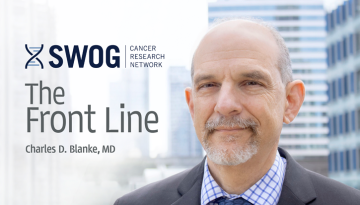ASCO 2016: On Your Mark, Get Set, Present!
SWOG goes in strong to the 2016 Annual Meeting of the American Society of Clinical Oncology next week, when members will make 21 presentations featuring our clinical trials. SWOG investigators will present on a wide variety of tumors, including lung, prostate, breast, ovarian, colorectal, and pancreatic, as well as melanoma. SWOG researchers will also present on cancer genetics, tumor biology, and patient and survivor care.
Cooperative research will take center stage in Chicago as one of four research reports at the ASCO plenary session on June 5. Led by the Canadian Cancer Trials Group, with support from other NCI network groups, this trial centered on the use of aromatase inhibitors in treating postmenopausal women with early-stage breast cancer. Dr. Julie Gralow, executive officer and former breast committee vice chair, represented SWOG on that Phase III study.
Being part of the ASCO plenary is significant. More than 5,000 research abstracts were submitted, and only the most impactful make the final cut. I could not be more pleased that a cooperative group study is in this mix. In 2016, our 60th year, SWOG and our partners in the National Clinical Trials Network continue to prove the adage of strength in numbers, backed by sound underlying science. Banding together allows us to help as many patients as possible.
I could go on. Instead, I’ll point you to our ASCO press release, which you can find on the SWOG website. I’ll also point you to a handy ASCO 2016 guide created by publications manager Pat Arlauskas. Browse all 21 presentations, and find out where and when you can find them, also by going to the SWOG website.
My thanks to Pat for compiling all this. And thanks to everyone heading to Chicago and representing SWOG. Have a great meeting.
Other Recent Stories



